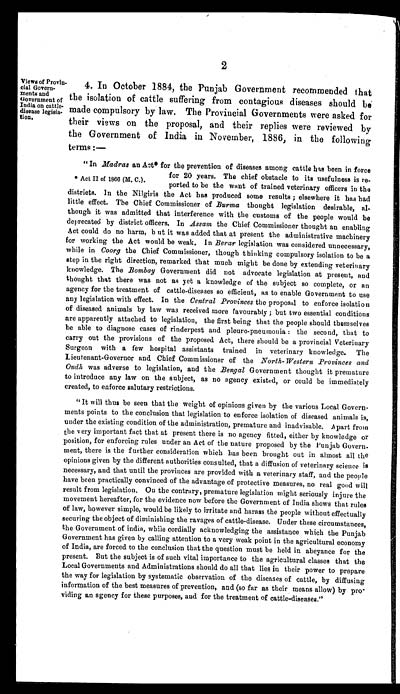Medicine - Veterinary > Civil Veterinary Departments > Civil Veterinary Department ledger series I-VI > Volume VI - Repression and prevention of cattle-diseases in India
(462) Page 2
Download files
Individual page:
Thumbnail gallery: Grid view | List view

2
Views of Provin-
cial Govern-
ments and
Government of
India on cattle-
disease legisla-
tion.
4. In October 1884, the Punjab Government recommended that
the isolation of cattle suffering from contagious diseases should be
made compulsory by law. The Provincial Governments were asked for
their views on the proposal, and their replies were reviewed by
the Government of India in November, 1886, in the following
terms:—
* Act II of 1866 (M. C.).
"In Madras an Act* for the prevention of diseases among cattle has been in force
for 20 years. The chief obstacle to its usefulness is re-
ported to be the want of trained veterinary officers in the
districts. In the Nilgiris the Act has produced some results; elsewhere it has had
little effect. The Chief Commissioner of Burma thought legislation desirable, al-
though it was admitted that interference with the customs of the people would be
deprecated by district officers. In Assam the Chief Commissioner thought an enabling
Act could do no harm, but it was added that at present the administrative machinery
for working the Act would be weak. In Berar legislation was considered unnecessary,
while in Coorg the Chief Commissioner, though thinking compulsory isolation to be a
step in the right direction, remarked that much might be done by extending veterinary
knowledge. The Bombay Government did not advocate legislation at present, and
thought that there was not as yet a knowledge of the subject so complete, or an
agency for the treatment of cattle-diseases so efficient, as to enable Government to use
any legislation with effect. In the Central Provinces the proposal to enforce isolation
of diseased animals by law was received more favourably; but two essential conditions
are apparently attached to legislation, the first being that the people should themselves
be able to diagnose cases of rinderpest and pleuro-pneumonia: the second, that to
carry out the provisions of the proposed Act, there should be a provincial Veterinary
Surgeon with a few hospital assistants trained in veterinary knowledge. The
Lieutenant-Governor and Chief Commissioner of the North-Western Provinces and
Oudh was adverse to legislation, and the Bengal Government thought it premature
to introduce any law on the subject, as no agency existed, or could be immediately
created, to enforce salutary restrictions.
"It will thus be seen that the weight of opinions given by the various Local Govern-
ments points to the conclusion that legislation to enforce isolation of diseased animals is,
under the existing condition of the administration, premature and inadvisable. Apart from
the very important fact that at present there is no agency fitted, either by knowledge or
position, for enforcing rules under an Act of the nature proposed by the Punjab Govern-
ment, there is the further consideration which has been brought out in almost all the
opinions given by the different authorities consulted, that a diffusion of veterinary science is
necessary, and that until the provinces are provided with a veterinary staff, and the people
have been practically convinced of the advantage of protective measures, no real good will
result from legislation. On the contrary, premature legislation might seriously injure the
movement hereafter, for the evidence now before the Government of India shows that rules
of law, however simple, would be likely to irritate and harass the people without effectually
securing the object of diminishing the ravages of cattle-disease. Under these circumstances,
the Government of india, while cordially acknowledging the assistance which the Punjab
Government has given by calling attention to a very weak point in the agricultural economy
of India, are forced to the conclusion that the question must be held in abeyance for the
present. But the subject is of such vital importance to the agricultural classes that the
Local Governments and Administrations should do all that lies in their power to prepare
the way for legislation by systematic observation of the diseases of cattle, by diffusing
information of the best measures of prevention, and (so far as their means allow) by pro*
viding an agency for these purposes, and for the treatment of cattle-diseases,"
Set display mode to: Large image | Zoom image | Transcription
Images and transcriptions on this page, including medium image downloads, may be used under the Creative Commons Attribution 4.0 International Licence unless otherwise stated. ![]()
| India Papers > Medicine - Veterinary > Civil Veterinary Departments > Civil Veterinary Department ledger series I-VI > Repression and prevention of cattle-diseases in India > (462) Page 2 |
|---|
| Permanent URL | https://digital.nls.uk/75517283 |
|---|



![[Page 1]](https://deriv.nls.uk/dcn4/7551/75517282.4.jpg)
